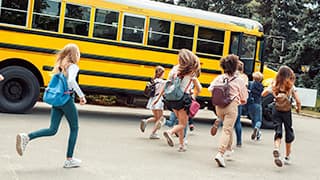Extended school closures not only result in mental atrophy, but also in damage to physical and mental health. This is especially true for low-income or otherwise vulnerable students who rely on schools for nutrition and safe harbor, and who need more instructional time-on-task. The summer months must be used to help repair the damage. The immediate strategy is to locate and engage all students in every system, whether district, charter or nonpublic, while preparing schools to receive them when public health officials determine schools should re-open. The long-term strategy is to customize education and supports to improve efficiency and effectiveness, while ensuring school systems are prepared for further disruptions. Components of such a strategy include the following:

Webinar
Ask the Expert: Bringing Students Back-to-School Following a Crisis with Paul Vallas
Join us June 16 with Paul Vallas as we explore strategies for providing a safe and secure school reopening.
Learn MoreBefore re-opening schools:
- Reconnect and engage those students/families who have “gone off the grid,” i.e., not responding to teacher outreach, not picked up a device, not attending “class,” failing to complete assignments, etc.
- Extend food and health care services to low-income students and their families over the summer
- Establish 24/7 “hotline” (phone, email, and/or school-based social media platform) which provides a vehicle for students and/or families in need to ask for help and for intelligence to be gathered anonymously
- Provide students with summer instruction (summer semester) and enrichment activities and support to prevent further brain atrophy and social-emotional health deterioration − blending both online and remote activities and support
- Use summer months as a time for teacher training and preparation to support remote learning
Upon re-opening schools:
- Assess students to determine their level of academic proficiency, as well as behavioral and emotional needs
- Use the assessments to develop a more personalized approach to instruction and student support, and determine the appropriate interventions using the RTI model
- Begin moving toward a more personalized “mastery approach” using technology to support more individualized instruction and learning
- Use online learning to provide re-teach opportunities while also expanding educational choices, instructional time on task and enrichment
How Facilitron Can Help
The Facilitron platform can assist in reducing liability and increasing staff, student, and community security and safety when allowing individuals back on campus. Here’s how:
- Facilitron’s “one-system-of-record” provides a single source for tracking all internal and external events on a campus. During the event entry process, screening documentation and hold harmless forms can be included in the terms and conditions sign off, as well as attached and stored with the reservation in the system. Permits are issued which can be used for entry, as a part of the check in process, and as a written guide to everyone involved in the ever changing COVID-19 district guidelines.
- Facilitron’s new Attendee Management features can be used to not only enforce limitations on the number of participants in each gathering, but to aid in tracking all individuals on campus by name, phone, email, and date/time of use. Triggers can be put in place based on number of attendees, to include things like: the number of available spaces, type of cleaning, and social distancing requirements.
- COVID-19 cleaning requirements can be scheduled based on facility size, number of attendees, and the current district guideline. Rules can be created in the platform to trigger service and staffing requirements tied directly to each reservation or as a stand-alone work order using Facilitron work orders. Additional costs can be added for external events to cover supply and employee time.
Remember, Facilitron can help implement all these changes with no out-of-pocket costs and without hitting the general fund.
For a closer look at how the Facilitron platform can be used to help ease staff, students, and community members on campus by streamlining the management of ever-changing federal, state, and local guidelines, contact us to schedule a demo today.
See Paul Vallas in person on June 16, 2020, during the Facilitron Ask the Expert interview “Returning to School Campuses.” Then on June 18, 2020, join us for a Facilitron Feature Demo to see how attendee management can create layers of liability protection for your district today!